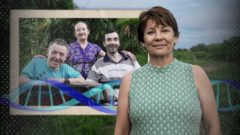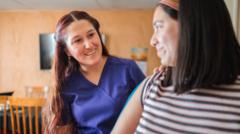In the small town of Serrinha dos Pintos in northeastern Brazil, a unique genetic condition has started to unveil itself thanks to the tireless work of geneticist Silvana Santos. This isolated community, home to about 5,000 residents, faced a perplexing mystery for years as an alarming number of children lost their ability to walk. With no explanations in sight, families lived in uncertainty until Santos's arrival more than 20 years ago brought crucial insights into the unusual case of Spoan syndrome, a disease unknown until then.
Spoan syndrome stems from a genetic mutation affecting the nervous system, leading to gradual physical deterioration. The condition appears when both parents pass on the altered gene, with Santos's work marking the first detailed account of the syndrome in medical literature. Acknowledged as one of the BBC's 100 most influential women in 2024, Santos has inspired confidence in the local population about their genetic concerns and provided hope for a community previously resigned to misunderstanding their medical plight.
Upon her first visit to the town—an invitation extended by family connections—Santos stumbled upon a social phenomenon where cousin marriages were prevalent due to geographical isolation. Nearly 30% of couples in Serrinha are related, a statistic that raises the risk of genetic disorders. According to research, while unrelated couples bear a 2-3% risk of having a child with a rare genetic disorder, for cousins, that chance rises to approximately 5-6%.
Santos’s in-depth research involved years of collecting DNA samples and detailed histories from residents of Serrinha. What started as a three-month research endeavor morphed into a long-lasting commitment. By 2005, her study unveiled the existence and genetic underpinnings of Spoan syndrome, linking it to a mutation thought to date back over 500 years to European settlers.
As Santos reflects on the advancements made, it's apparent that public perception of affected individuals has evolved. Negative stigmas lingered, but with newfound knowledge and access to assists like wheelchairs, families have witnessed an improvement in their quality of life. Ongoing research aims to further educate locals about genetic risks, ensuring couples can make informed decisions while embracing their cultural practices.
Local residents like Inés, with two affected sons, describe a deep connection to the community's history, with many feeling a familial bond to Santos as she continues to facilitate understanding and support. The work coming from Serrinha does not intend to diminish cousin marriages but instead seeks to introduce genetic awareness in hopes of healthier future generations.













